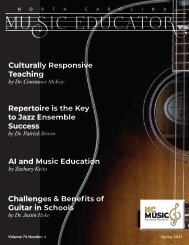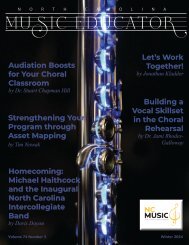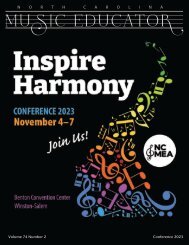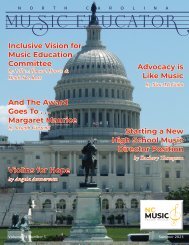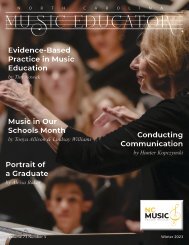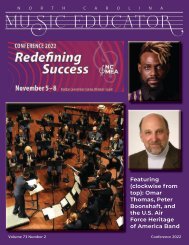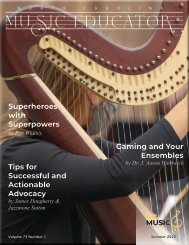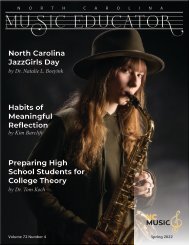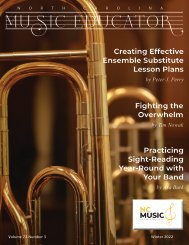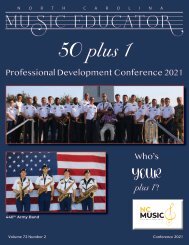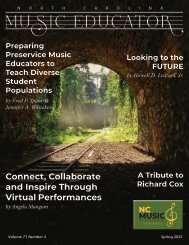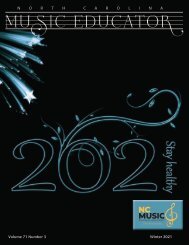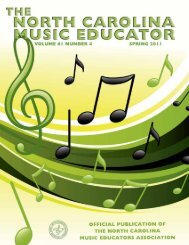North Carolina Music Educator Journal Summer 2021
Professional journal for North Carolina music educators, Summer 2021
Professional journal for North Carolina music educators, Summer 2021
You also want an ePaper? Increase the reach of your titles
YUMPU automatically turns print PDFs into web optimized ePapers that Google loves.
y James Daugherty<br />
Making the Grade:<br />
Getting an A for<br />
Advocacy<br />
Photo by Kimberly Farmer on Unsplash<br />
<strong>Music</strong> transforms people and communities.<br />
People and communities transform music.<br />
Thinking back to the time I was finishing my bachelor’s<br />
degree, I recall a general education course containing an<br />
intriguing method for motivation to be successful. This<br />
course had many professors teaching it, but there was one who<br />
designed the course so unit tests were administered in a computer<br />
lab. That was new for the time, but not the most innovative aspect<br />
of the course design.<br />
From the onset of the class, every student knew the number of<br />
required tests. Students could test anytime they were ready. Tests<br />
were not tied to a calendar or completion of a certain number of<br />
lectures. One unique aspect of this particular course was the ability<br />
of every student to predetermine their final grade from day one.<br />
This was accomplished by knowing in order to earn an A in the<br />
course, a certain number of tests had to be taken with a minimum<br />
pre-established score. To earn a B in the course, a student would<br />
have several A test grades and a majority of B test grades; however,<br />
nothing lower than a B. There was only one other option: failure. It<br />
was an A, a B, or an F.<br />
The selling point for many students to take the course with this<br />
professor was that everyone enrolled in the course was, more or<br />
less, guaranteed a B or even the coveted A if they met the criteria<br />
measured by the tests in the lab because any test could be taken as<br />
many times as needed in order to achieve the desired grade.<br />
Perfectionists and procrastinators alike found a home in this<br />
course as the professor would allow students up to one incomplete<br />
for the initial semester for the opportunity to continue their testing<br />
to either solidly earn their mark of B or A by completing all tests by<br />
the end of the semester that followed the incomplete.<br />
When I registered for the course, I remember thinking<br />
it seemed like a no-brainer, a course that guaranteed an A.<br />
Considering all options, I eagerly enrolled in the course.<br />
Time certainly changes opinions. I initially expected, and was<br />
whole-heartedly on track, to earn an A. However, after taking a few<br />
tests, one was particularly tough. While I can’t recall how many<br />
retakes it took, I finally settled for a B in order to move forward. I<br />
had no plans of taking an incomplete and thought I’d knock these<br />
tests out quickly so as to not worry about them. Eventually, I got to<br />
a crossroads and a decision had to be made.<br />
After having now accepted several B’s along with A’s, I had<br />
reached the limit of B’s allowed in order to earn an A overall. It was<br />
a tough decision because I was only finished with a little over half<br />
the required tests, and I didn’t know how hard they would be in the<br />
future or how much time they would take. Yielding to the voice of<br />
compromise, I accepted a B on the current test which meant I now<br />
had a B in the course and could not make anything less than a B on<br />
any more tests or risk failure.<br />
When the work gets tough on the test (no matter what it is or in<br />
what form it takes), circumstances may tempt us to accept less than<br />
our best or even accept failure as an option. Difficulty and rigor of<br />
the task, the true grit of the work, often beg us to settle for less than<br />
an A.<br />
Unfortunately, life does not always afford the opportunity to<br />
know there are only a certain number of tests or challenges, and<br />
that being successful with a certain number of them will allow us to<br />
not only pass the moment, but to also achieve that coveted highest<br />
mark or rating.<br />
Teaching and learning music during the last year and a half of<br />
global pandemic has to be one of the biggest tests music education<br />
ever faced. We didn’t know it was coming and we certainly did not<br />
know what it would take to pass or how many times we’d have to<br />
try it again. But, through it all, we have learned uncertainty does<br />
not equate to defeat.<br />
We have also learned that, often, our most successful work<br />
comes through shared social-emotional support and relationships.<br />
In fact, we probably have more appreciation for the value of human<br />
connection through music than at any point in our memory.<br />
We’ve learned that not all tests must be taken alone. Socialemotional<br />
and relational wellness are significant in supporting<br />
efforts to achieve an A during life’s tests and in nurturing the<br />
health of music education. How do we march forward, postpandemic,<br />
not knowing the number of tests we have ahead that<br />
will lead us to failure or success – especially after all we’ve already<br />
passed? And where do we, as musicians, get the social-emotional<br />
and relationship/networking support we need, to not only be<br />
successful, but to make an A?<br />
UNC Charlotte is shaping a new era in music education<br />
to prepare productive, successful, engaged musical citizens.<br />
Be part of the transformation.<br />
@unccarts<br />
music.uncc.edu<br />
14 | NORTH CAROLINA MUSIC EDUCATOR NORTH CAROLINA MUSIC EDUCATOR | 15




